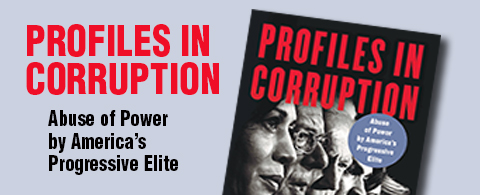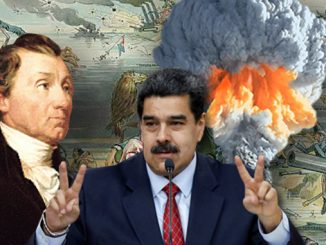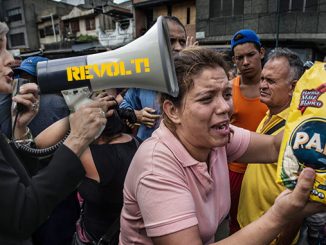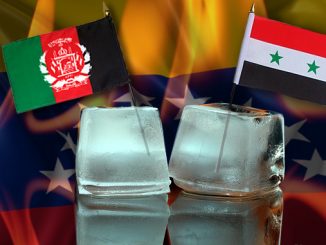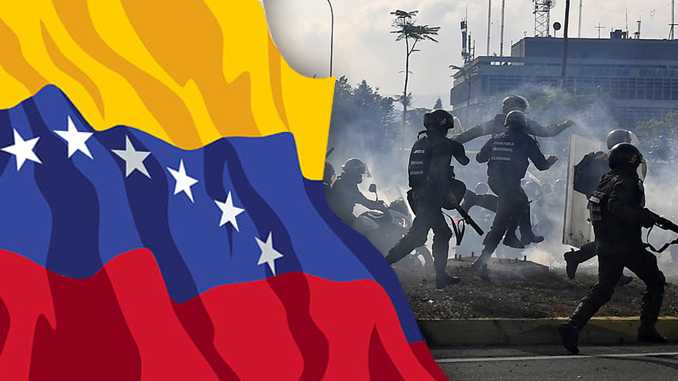
South American nation poses no threat to America, so why all the threats?
By Phil Giraldi
One might reasonably argue that the United States has been telling Latin America what to do ever since the Monroe Doctrine was declared in 1823. That document warned European countries that further interference in the Western Hemisphere would not be tolerated by the fledgling United States, but it said nothing about what America might itself do in fulfillment of its “manifest destiny.” The answer to that came in 1846-48 with the war against Mexico, which was by that time an independent republic with no ties to Europe. The U.S. obtained California, New Mexico, Arizona, Utah, Nevada, Texas, and Colorado in the process.
The United States of America has been engaged in something like gunboat diplomacy ever since, to include the Spanish-American War of 1898, which resulted in the acquisition of Puerto Rico and the Philippines. Starting in the 1930s there were regular interventions in the Caribbean to protect U.S. investments, leading Gen. Smedley Butler—the most highly decorated U.S. Marine in American history—to declare “war is a racket.”
With the Cold War, Washington’s interest in Latin America shifted into higher gear. It was presumed that communist infiltration of populist movements in the region would eventually lead to a government somewhere that would establish close ties to Moscow. That was seen as too close to home by the security team in Washington, therefore an existential threat that could not be ignored. And then the nightmare became reality in Cuba in 1958, when Fidel Castro overthrew the corrupt regime of Fulgencio Battista and established a Marxist-socialist government.
U.S. intelligence agencies committed themselves to making sure Cuba would not be repeated and used fair means as well as foul to discredit or otherwise destroy any socialist or populist movements that might try to break away from the firm grip of the U.S.A. Salvador Allende was overthrown by a CIA-organized coup in Chile in 1973, Jacobo Arbenz in 1954 in Guatemala, and Che Guevara was hunted down and killed by a joint U.S.-Bolivian hit team in Bolivia in 1967. Other U.S. military interventions took place with the notorious Bay of Pigs in Cuba as well as in Panama and Grenada.
And then there is the case of Venezuela. Venezuela was particularly galling to policymakers in Washington for two reasons. First, it was a major oil producer and its largest market was the United States, which in and of itself meant that it could unilaterally create energy supply problems for Americans. Second, in 1998, it successfully carried out at the ballot box a socialist-populist revolution, which it chose to label Bolivarian, under the leadership of Hugo Chavez. Hostility towards the outspoken Marxist-Leninist Chavez was a permanent state and the Venezuelan president reciprocated by putting pressure on American businesses operating in his country, eventually forcing companies to sell their products at controlled prices while also making it difficult to repatriate profits.
The nightmare most feared by Washington—an increasing number of socialist-populist regimes in Latin America—appeared to be taking place following the Chavez example. Ecuador elected Rafael Correa, Nicaragua was led by Daniel Ortega, and Evo Morales took power in Bolivia.
The U.S. tried to remove Chavez in 2002 by way of a coup that failed. It then put pressure on him through sanctions and by rallying the poodles in the Organization of American States. But when Chavez died in 2013, Vice President Nicolas Maduro was able to win the subsequent election in April 2013. He was reelected in May 2018. Maduro lacks the charisma of Chavez and his increasingly heavy-handed corrupt rule combined with a failing economy, a legacy from Chavez, has made him unpopular. The U.S. has seen an opportunity to push back, supporting pro-American candidate Juan Guaido, who is president of the country’s National Assembly.
Since the arrival of the Trump administration, the “maximum pressure” on Venezuela for regime change has been unrelenting, to include sanctions and the launching of a soft coup in November 2019 that failed completely when the military did not rise up to support the plotters. The coup was based on an evidence-free U.S. assertion that the election of Maduro had been fraudulent. Sanctions on Venezuela have done grave damage to the economy to include food shortages, leading to a major refugee crisis with five million Venezuelans, 15% of the population, now finding sanctuary in neighboring Colombia, as well as elsewhere in Latin America.
The U.S. has made it particularly difficult for Venezuela to buy drugs to treat the coronavirus and a $5 billion loan sought from the International Monetary Fund for medical supplies was blocked by the United States. Secretary of State Mike Pompeo argued that it was impossible to determine who to give the money to as Maduro is not recognized as legitimate by the U.S., and Guaido has been unable to replace him for fear the Venezuelan military will use force to stop that from happening. Pompeo has urged the creation of a “transitional government” as a caretaker for new elections and has also proposed a conference to determine who is the legitimate head of state, with Maduro and Guaido proxies represented with Washington at the table to moderate. That would, of course, guarantee a 2-1 advantage for Guaido.
One might say that Washington is waging a war of words, but it is in reality a full-blown economic war being waged “to restore democracy to Venezuela.” People are dying as a result. And there are also plans to ratchet up the conflict coming straight out of the Trump White House. In August 2017 President Trump entertained the idea of staging a direct military attack on the country, but was dissuaded by his then National Security Advisor H.R. McMaster and Secretary of State Rex Tillerson.
More recently, administration hawks Pompeo, National Security Advisor Robert O’Brien, and Director of National Intelligence Richard Grenell have proposed a direct attack on Venezuela to take advantage of the problems caused by the coronavirus and a sputtering economy. But the president was dissuaded due to strong objections by the Pentagon, which considers the U.S. military to be overstretched without adding another new war to its slate. Trump did, however, authorize planning for an attack to proceed as a “contingency,” so the option is still on the table.
More recently, Pompeo and company have come up with a new angle. Again, without any evidence, they have labeled Maduro a drug trafficker and have dispatched warships to hover off the coast of Venezuela to intercept presumed drug cargoes. It is quite likely that there are expectations in the White House that some kind of incident will develop that can be conveniently escalated.
Many believe that the hard line on Venezuela is related to the U.S. policy toward Cuba, and is driven by the same group, the powerful Cuban Lobby in Florida. Ironically, the hostility from Washington comes after an early 2018 election in which moderate Miguel Diaz-Canel was elected Cuban president, the first time in 60 years that someone named Castro has not led the country. Diaz-Canel’s government helped draft a new constitution in April 2019 that liberalized the economy and political structure. Now he is being confronted by a hostile Washington and the reform movement has stalled.
The oddest thing about the crisis between Venezuela and the United States is that Washington has absolutely nothing to gain from the conflict. Venezuela does not threaten Americans in any way, and even its populist/revolutionary appeal has gone stale. Ecuador and Bolivia are again being run by conservative leaders beholden to Washington, and they have also been joined by the right-wing extremist Jair Bolsonaro from Brazil. The Venezuelan National Guard would presumably be easy prey for the armed might of the United States, but so what? Does Washington need another militarily occupied dependency where unhappy locals increasingly demand that Uncle Sam go home? The truth is that Sam should stay at home and leave the Venezuelans alone.
Philip Giraldi is a former CIA counter-terrorism specialist and military intelligence officer and a columnist and television commentator. He is also the executive director of the Council for the National Interest. His other articles appear on the website of “The Unz Review.”



